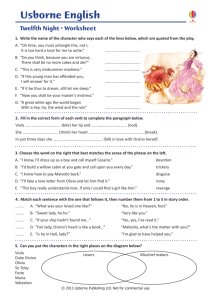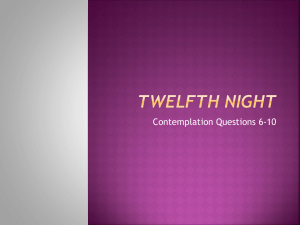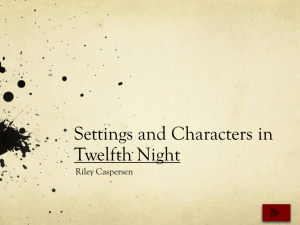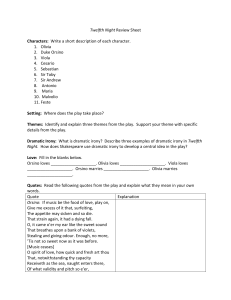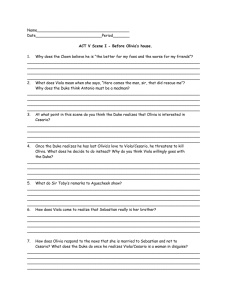Twelfth Night, or What You Will
advertisement
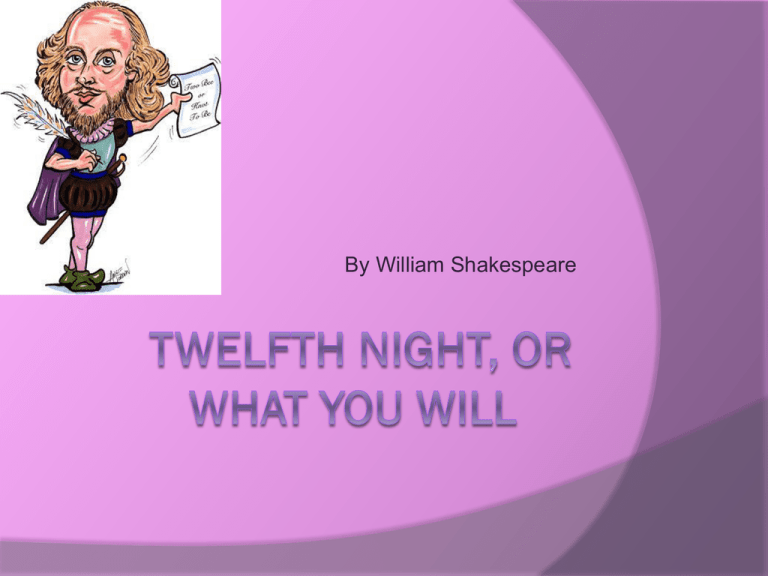
By William Shakespeare Background Information Comedy Written 1600-1 First performed February 2, 1602 Comedy Has a happy ending The protagonist is better off at the end About normal, everyday people Tragedy The protagonist is a noble The noble is worse off at the end of the story The hero is essentially admirable. The protagonist “Falls” due to an internal vice such as vanity. Characters Viola-shipwrecked lady Sir Andrew Aguecheek—Toby’s friend Olivia-Illyrian countess Malvolio-Olivia’s steward Maria—Olivia’s servant Fool (Fete) Olivia’s jester Sir Toby Belch— Olivia’s relative Fabian--gentlewoman More Characters Orsino—Duke of Illyria Antonio— Sebastian’s friend Valentine and Curio—gentlemen serving Orsino Captain Priest Two officers Sebastian—Viola’s brother ASSIGNMENT Create a chart with each characters’ name and relationship to other characters. Setting: Act I scene I Duke Orsino’s court in Illyria. Pun: a play on words Hart and heart by Orsino ASSIGNMENT: Make a list of other examples of puns. Include quotes, line #s, and explanations Pun Assignment Pun Explanation “That instant I was turned Orsino explains that into a hart / And my ever since Olivia desires, like fell and cruel captured his heart, he hounds / E’er since feels like a hart being pursue me,” (Shakespeare, 1993, 1.1. chased by hounds. 22-4). Citation: (Last, year, Act. Scene. Lines) Act I Scene I What will Olivia do for the next 7 years? How does Orsino react to the news? Act I Scene 2 Setting Near a ship in Illyria Act I Scene 2 How does the captain give Viola hope? What is Viola’s plan? Do you think it’ll work? Act I Scene 3 Describe Sir Toby and Sir Andrew Appearance Manner of speaking Character traits Treatment by Maria Treatment of Maria Act I Scene 3 line 122 What are “these things?” Act I Scene 4 How does Orsino treat Cesario (Viola)? What is the relationship between these two characters? What errand is Cesario assigned? How does Viola feel about Orsino? How do you know? Feste the fool Fete means “festival” Fools, or court jesters, were hired to entertain the nobles with their wit and quick humor. They “played the fool,” but were actually quite intelligent. Act I Scene 5 Why could Feste be in trouble? How does he get away with it? What puns should you add to your list? Act I Scene 5 Describe the interaction between Olivia and the Fool from lines 36-70 What does Malvolio say to irritate the fool? How does Olivia react to this statement? Act I Scene 5 How does Olivia react to Sir Toby’s drunkenness? How does the Fool react? What did Viola say to gain admittance to Olivia’s house? Act I Scene 5 Why will Viola speak in front of Olivia, but not her servants? Describe the dialogue about the picture (lines 229-249). Act I Scene 5 How does Olivia feel about Viola? (lines 295-301) Why does Olivia give the ring to Malvolio? What is her purpose? ASSIGNMENT Summarize Act I. 6+1 rubric for grading Underline the thesis (last sentence, 1st paragraph) Include topic sentence for each paragraph ASSIGNMENT: Create a drawing of each character. Be sure that the clothing is appropriate to the character’s status. Use color and clothing to show character traits. May be computer generated or hand-drawn. ACT II Scene 1 What is Sebastian’s problem? What danger will Antonio undergo? Why? ACT II Scene 2 How does Viola react to receiving the ring? What does she think is going on? Orsino Olivia Viola / Cesario ACT II Scene 3 Describe the setting Describe the interactions among Sir Toby, Sir Andrew, and the Fool. What will happen to the three men, according to Maria? ACT II Scene 3 How do Sir Andrew, Sir Toby, and the Fool treat Malvolio? Why do they act this way? Where does Maria fit in with their relationships. ACT II Scene 3 Why is Maria upset with Malvolio? What is Maria’s plan to get even with Malvolio? (lines 154-60) What does Sir Andrew want? (lines 1823) ACT II Scene 4 Feste, the fool, was at Orsino’s house last night. Very irregular for a servant More freedom than typical What does this suggest about Feste’s character? ACT II Scene 4 What advice does Orsino give Viola about dating? What’s your reaction to this advice? According to Orsino, what’s the difference between a man’s love and a woman’s? (103-13) How does Viola counter this? ACT II Scene 4 132-5: What do these lines mean? Why doesn’t Orsino react to them? ACT II Scene 5 Describe Malvolio. What kind of person is he? What is Malvolio talking to himself about? (22-82) ACT II Scene 5 “Some are born great, some achieve greatness, and some have greatness thrust upon ‘em” (Shakespeare, 1993, 2.5. 149-40). What’s your reaction to this quote? Do you agree or disagree? Why? ACT II Scene 5 The letter directs Malvolio to: Be grumpy with a kinsman and servants Talk about your political opinions Wear yellow stockings Be cross gartered ACT II Scene 5 How do Sir Toby and Sir Andrew feel about Maria? Why? How do you know? Why did Maria choose the color yellow, cross gartering, and smiling? Act III Scene 1 What is the Fool saying about language? (1-22) Viola says to Feste, “I warrant thou art a merry fellow and car’st for / nothing, (Shakespeare, 1933, 3.1. 27-8). How does Feste respond? How does this show his roundness as a character? Act III Scene 1 Lines 61-9: What does Viola say about being a Fool? Do you agree or disagree? Why? “I am bound to your niece” (Shakespeare, 1933, 3.1. 77). What is the pun in this line? Act III Scene 1 What does Sir Andrew think about Viola’s comments to Olivia? How do you know? How does Viola feel about Olivia? How does Olivia react to this news? Act III Scene 1 Lines 145-151: What is being said in these lines? Why is it important? “Love sought is good, but given unsought is better,” (Shakespeare, 1993, 3.1. 164). Do you agree or disagree with this quote? Why? Act III Scene 2 Why is Sir Andrew upset? How does Fabian calm him? What “challenge” does Sir Andrew write? To whom? Why? What does Maria lead Sir Andrew and Sir Toby to see? Act III Scene 3 Why isn’t Antonio safe in Illyria? What arrangements to Antonio and Sebastian make? Act III Scene 4 Describe the interaction between Olivia and Malvolio. (lines 17-61). How would you react if you saw someone acting this way? What is Malvolio’s reaction to his treatment. Is it as you predicted? Act III Scene 4 What does Sir Toby decide to do to Malvolio? (lines 144-50). What is the purpose of Sir Andrew’s letter? To whom shall it be sent? Act III Scene 4 What will Sir Toby do with the letter? What is Viola’s reaction to the challenge to duel? What is Toby’s role in the duel? What do you think of him for doing this? Act III Scene 4 How is Viola saved from the duel? Why did Antonio do this? What happens to Antonio? Lines 341-2 What’s happening in lines 344-75 Act III Scene 4 Why does Viola think her brother might still be alive? How does she feel about this news? What do Toby and Fabian think of Viola? Act IV Scene 1 Describe the interaction between Feste and Sebastian. What is Feste going to do when he leaves? Why does Sir Andrew beat Sebastian? Act IV Scene 1 How does Olivia end the fight between Sir Andrew and Sebastian? How does Sebastian feel about Olivia? Act IV Scene 2 What will Feste pretend to be? Why? Malvolio says that it’s dark. How does Feste (Sir Topas) respond? Sir Toby wants the joke with Malvolio to end. Why? Act IV Scene 2 How does Malvolio feel? How do you feel about his character? Are you sympathetic, or does he deserve it? Act IV Scene 3 What are Sebastian and Olivia going to do? Why will it be done in secret? Act V Scene 1 What is the purpose of Orsino’s discussion with Feste? How does Orsino react to seing Antonio? How does Antonio explain his presence in Illyria? Act V Scene 1 Orsino knows that Olivia loves Viola. What does he threaten to do to Viola? How does Viola react to hear that she’s married to Olivia? What proof does Olivia use? Act V Scene 1 Why is a surgeon needed? Lines 182-8 Lines 226-7: How are the mysteries resolved? Who does Sebastian think Viola is? How does she explain her masculine clothing? Act V Scene 1 Lines 330-5: What is Olivia saying? Whom did Sir Toby marry? Why? “For the rain it raineth every day” (Shakespeare 1993, 5.1. 415). What does this line mean? Is it “in character” for Feste? Does it fit the mood of this scene?
